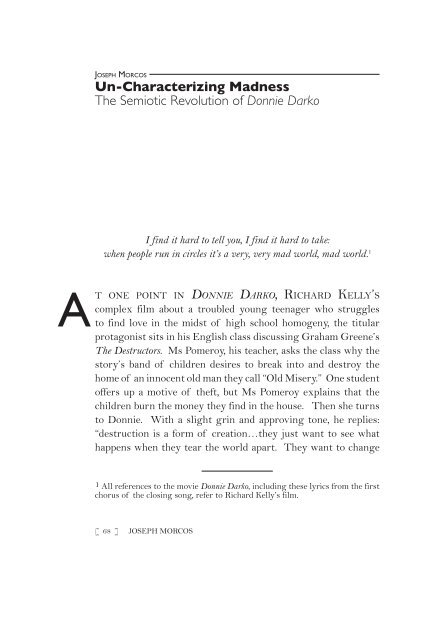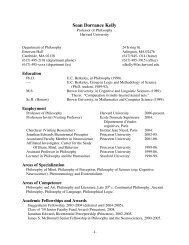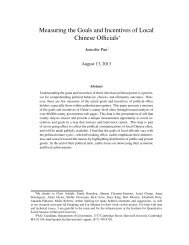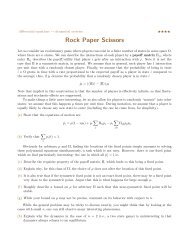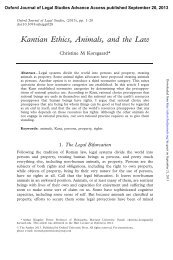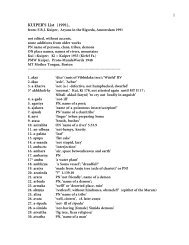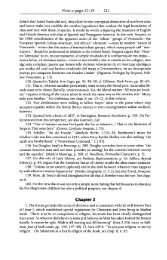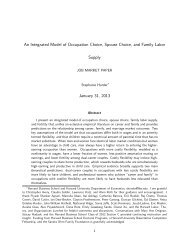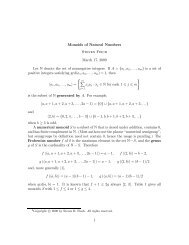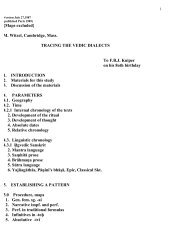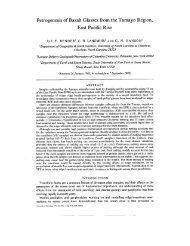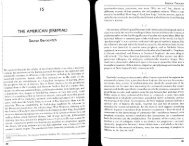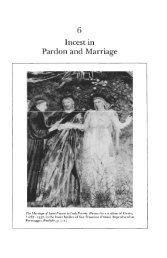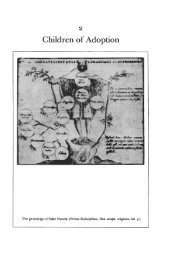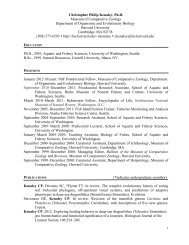Un-Characterizing Madness The Semiotic Revolution of Donnie Darko
Un-Characterizing Madness The Semiotic Revolution of Donnie Darko
Un-Characterizing Madness The Semiotic Revolution of Donnie Darko
Create successful ePaper yourself
Turn your PDF publications into a flip-book with our unique Google optimized e-Paper software.
A<br />
Jo s e P h mo r c o s<br />
<strong>Un</strong>-<strong>Characterizing</strong> <strong>Madness</strong><br />
<strong>The</strong> <strong>Semiotic</strong> <strong>Revolution</strong> <strong>of</strong> <strong>Donnie</strong> <strong>Darko</strong><br />
I find it hard to tell you, I find it hard to take:<br />
when people run in circles it’s a very, very mad world, mad world. 1<br />
t o n e p o i n t in do n n i E da r k o, ri c h a r d ke l ly’s<br />
complex film about a troubled young teenager who struggles<br />
to find love in the midst <strong>of</strong> high school homogeny, the titular<br />
protagonist sits in his English class discussing Graham Greene’s<br />
<strong>The</strong> Destructors. Ms Pomeroy, his teacher, asks the class why the<br />
story’s band <strong>of</strong> children desires to break into and destroy the<br />
home <strong>of</strong> an innocent old man they call “Old Misery.” One student<br />
<strong>of</strong>fers up a motive <strong>of</strong> theft, but Ms Pomeroy explains that the<br />
children burn the money they find in the house. <strong>The</strong>n she turns<br />
to <strong>Donnie</strong>. With a slight grin and approving tone, he replies:<br />
“destruction is a form <strong>of</strong> creation…they just want to see what<br />
happens when they tear the world apart. <strong>The</strong>y want to change<br />
1 All references to the movie <strong>Donnie</strong> <strong>Darko</strong>, including these lyrics from the first<br />
chorus <strong>of</strong> the closing song, refer to Richard Kelly’s film.<br />
[ 68 ] JOSEPH MORCOS
things.” <strong>Donnie</strong>’s understanding <strong>of</strong> <strong>The</strong> Destructors goes not to its<br />
characters’ criminal act, but rather to the way its characters might<br />
alter the crime’s significance – destruction becomes creation. In<br />
one sense, <strong>Donnie</strong>’s reading <strong>of</strong> the story acknowledges that the<br />
arson cannot govern its own semantic significance. This model,<br />
by which <strong>Donnie</strong> claims the very meaning attached to the arson,<br />
not only helps define <strong>Donnie</strong>’s character but also speaks to Kelly’s<br />
film at large, in which the troubled youth must negotiate a wide<br />
gamut <strong>of</strong> institutional pressures in order to carve out a personal<br />
sense <strong>of</strong> the world.<br />
But this scene in <strong>Donnie</strong> <strong>Darko</strong> speaks equally to the larger<br />
issue <strong>of</strong> semiotics, or the experience <strong>of</strong> meaning, and its relation<br />
to society. <strong>The</strong> film addresses a society’s regulation <strong>of</strong> meaning<br />
and how an individual, like <strong>Donnie</strong>, might lead a revolution<br />
against these semiological constructs. <strong>Donnie</strong>’s quest in the film<br />
does not pit him against individuals per se, but rather against<br />
frameworks <strong>of</strong> how meaning should operate – those imposed<br />
structures that attempt, as Els Van Dongen might understand<br />
<strong>Donnie</strong>, to rob him <strong>of</strong> his “personal world <strong>of</strong> significations” (1).<br />
Though not dealing specifically with <strong>Darko</strong>, Dongen prompts a<br />
deeper consideration <strong>of</strong> meaning amid the potential madness that<br />
tinges the film. <strong>The</strong> question for psychiatrists like Dongen is the<br />
moment in which this “personal world <strong>of</strong> significations” devolves<br />
into madness. Says Dongen: “psychotic people are thought to<br />
have access to a world <strong>of</strong> meaning that remains locked to others”<br />
(1). As <strong>Donnie</strong> upends the authoritarian prompts <strong>of</strong> language,<br />
teachers, and celebrity therapists, he may seem to be mad; indeed,<br />
he seems to reject the very laws <strong>of</strong> the cosmos. But, following<br />
<strong>Donnie</strong>’s upheavals <strong>of</strong> expectation, he might claim himself to<br />
be simply living among madness – hence his understanding <strong>of</strong><br />
arson as an act <strong>of</strong> creation. Perhaps the most revolutionary claim<br />
UN-CHARACTERIZING MADNESS [ 69 ]
I<br />
<strong>of</strong> <strong>Donnie</strong> <strong>Darko</strong> is <strong>Donnie</strong>’s assertion that it is an individual’s<br />
ability – duty even – to disturb the normative meanings attached<br />
to societal prompts. In this sense, the debate over madness can be<br />
re-signified as a debate over duty. Shed <strong>of</strong> societal prompts, the<br />
individual can construct a personally desired sense <strong>of</strong> significance<br />
from the surrounding world, not because he is mad, but because<br />
he must. For <strong>Donnie</strong>, it is a matter <strong>of</strong> survival.<br />
s o l at i o n o f t h e f i l m’s s e m i o l o g i c a l c l a i m s, o r h o w m E a n i n g<br />
functions, is certainly not an easy task; one must first lay aside<br />
<strong>Darko</strong>’s slippery plotlines, endless cultural references, and<br />
tangled chronology. But even then, how does one begin to<br />
discuss the film’s wealth <strong>of</strong> semiological exclamations? <strong>The</strong><br />
human sciences employ a convenient philological vocabulary<br />
to articulate, in this instance, <strong>Donnie</strong>’s personal understanding<br />
<strong>of</strong> arson, but this philological vocabulary also applies to any<br />
society-created system that allows for such an upheaval, or<br />
“transfer,” <strong>of</strong> meaning. In other words, the technical discussion<br />
<strong>of</strong> language becomes a model for the general examination <strong>of</strong> the<br />
human sense <strong>of</strong> significance. Language, therefore, is not limited<br />
to the conventions <strong>of</strong> words, but can be applied likewise to events<br />
that hold significance. As presented by linguist Ferdinand de<br />
Saussure, the foundational claim holds that in language there<br />
exists an inherent division between the event <strong>of</strong> language (what<br />
might be understood as the act <strong>of</strong> arson in the Destructors) and<br />
its attached meaning (how <strong>Donnie</strong> interprets that arson as an<br />
act <strong>of</strong> creation). Saussure labeled these events and meanings<br />
“signifier” and “signified,” respectively, in which they form pairs<br />
(“signs”) for the sake <strong>of</strong> meaning. Saussure makes the radical<br />
claim that, however counterintuitive, it is the signifier that limits<br />
and defines the signified; he argues, essentially, that language<br />
[ 70 ] JOSEPH MORCOS
controls meaning. <strong>The</strong> nebulous, uncontrollable urges and<br />
formless thoughts contained within the human psyche – the<br />
savage, socially untouched sense <strong>of</strong> meaning – is actually under<br />
the power <strong>of</strong> arbitrarily invented societal prompts.<br />
<strong>The</strong> film’s disreputable pop-therapy master, Jim<br />
Cunningham, provides an example <strong>of</strong> Saussure’s claim that<br />
language controls meaning. Throughout the film Cunningham<br />
preaches the self-help binary “fear vs. love,” and believes <strong>Donnie</strong><br />
is “controlled by fear.” In doing so, Cunningham assumes that<br />
there is a distinct human emotion clearly aligned with “fear.”<br />
<strong>The</strong> pop-therapy master understands a segment <strong>of</strong> meaning to<br />
be aligned succinctly with a certain resulting linguistic signifier,<br />
the word “fear.” Saussure, though, would assert the opposite:<br />
it is Cunningham’s use <strong>of</strong> “fear” that defines what it means.<br />
Language for Saussure is not a simple “nomenclature” that works<br />
to articulate preexisting structures <strong>of</strong> meaning. Rather it is the<br />
empty word that manages to divide and imply a certain signified<br />
– those emotions associated with fear, fright, and terror. This<br />
tidy package <strong>of</strong> signifier and subjugated meaning form Saussure’s<br />
sign. And again, Saussure would argue that <strong>Donnie</strong>’s emotions<br />
result from certain combinations <strong>of</strong> prompts and randomly<br />
assigned significance. “<strong>The</strong> bond between signifier and signified,”<br />
for Saussure, “is arbitrary” (788). What <strong>Donnie</strong> shows us, then,<br />
is that the relationship between signifier and signified is not only<br />
arbitrary, but alterable. In other words, where Saussure shows<br />
us that the genesis <strong>of</strong> meaning is arbitrary but to some degree<br />
socially determined, <strong>Donnie</strong> shows us that meaning continues to<br />
be a calculus <strong>of</strong> signification. For <strong>Donnie</strong>, even after the signifier is<br />
arbitrarily assigned to the signified, meaning continues to change.<br />
<strong>The</strong> state <strong>of</strong> “fear” that Cunningham so adamantly opposes does<br />
not, in fact, preexist its word. <strong>Donnie</strong> aims throughout the film<br />
UN-CHARACTERIZING MADNESS [ 71 ]
to overthrow this linguistic opposition.<br />
“Fear and love,” the “lifeline” Cunningham devises to map the<br />
human psyche, cannot, then, be “the deepest <strong>of</strong> human emotions.”<br />
Embracing the construct, Mrs. Farmer, Cunningham’s dedicated<br />
supporter, imposes the binary upon the students <strong>of</strong> Middlesex<br />
High; they are told that every scenario – every action – merits<br />
placement on Cunningham’s fear vs. love “spectrum.” <strong>Donnie</strong>,<br />
though, realizes that such a binary exists not to reflect upon<br />
the truth <strong>of</strong> human emotion (“life isn’t that simple,” he objects),<br />
but rather to limit and sterilize something nebulous and utterly<br />
unstructured (he accuses Mrs. Farmer <strong>of</strong> ignoring “the whole<br />
spectrum <strong>of</strong> human emotion”). But, as Mrs. Farmer at one point<br />
unintentionally implies, there is nothing intrinsically meaningful in<br />
the “fear” and “love” signifiers – their power comes simply because<br />
“the lifeline is divided that way.” <strong>The</strong>orist Tor Hernes would<br />
describe these prompts <strong>of</strong> fear and love as “mere labels, loose<br />
prescriptions or elaborate models” (49). Or, as Dongen might<br />
have it, the students performing this “lifeline” exercise “have no<br />
medium <strong>of</strong> expression other than that defined by culture, and<br />
therefore are expected to abide by the means provided” (5). In<br />
refusing to participate in Mrs. Farmer’s exercise and exposing to<br />
the school the absurdity <strong>of</strong> Cunningham’s binary, <strong>Donnie</strong> rejects<br />
the imposition <strong>of</strong> linguistic structure; he refuses to “abide by the<br />
means provided.” For him, the meaning contained in the endless<br />
sea <strong>of</strong> human emotion is far too great and infinitely complex to<br />
be reduced to two linguistic signifiers.<br />
In this example, Kelly’s film encourages a resistance to<br />
these impositions (the viewer clearly sides with <strong>Donnie</strong> over the<br />
administration), but has not yet provided a solution to this linguistic<br />
problem. How, then, can one escape and overcome the totalitarian<br />
rule <strong>of</strong> the linguistic signifier over the human experience <strong>of</strong><br />
[ 72 ] JOSEPH MORCOS
meaning? <strong>Donnie</strong> <strong>Darko</strong> provides countless examples <strong>of</strong> these<br />
private rebellions, these personal revolts against culturally fixed<br />
structures. Essentially, the semiological revolution involves<br />
a constant re-signification <strong>of</strong> these structured signifiers. <strong>The</strong><br />
language remains; it is only the normatively associated meaning<br />
that is reconsidered. Claude Lévi-Strauss and Jacques Derrida,<br />
who applied Saussure’s theory <strong>of</strong> linguistics to anthropology and<br />
philosophy (respectively), supplement Saussure’s vocabulary with<br />
the term “bricolage,” French for “tinkering.” <strong>The</strong>ir focus on the<br />
social and cultural manifestations <strong>of</strong> Saussure’s ideas, particularly<br />
the bricoleur, aid a discussion <strong>of</strong> rebellion and revolutionaries, like<br />
<strong>Donnie</strong>, who individually appropriate established forms to create<br />
a desired sense <strong>of</strong> meaning. For Derrida, “[t]he bricoleur…is<br />
someone who uses ‘the means at hand,’ that is, the instruments<br />
he finds at his disposition around him…not hesitating to change<br />
them whenever it appears necessary” (1210). This bricoleur<br />
therefore assumes that “meanings are not given unalterably in<br />
advance, but can be changed” (Belsey 89).<br />
It is this same bricolage that makes its appearance in <strong>Donnie</strong>’s<br />
English class: the burning <strong>of</strong> Old Misery’s house is clearly<br />
the signifying event, and its conventional meaning <strong>of</strong> sadness,<br />
desolation and reduction its signified. Here, the viewer finds<br />
something unexpected: <strong>Donnie</strong> turns destruction into a kind <strong>of</strong><br />
creative bounty. <strong>The</strong> sign in this case, the act <strong>of</strong> destruction<br />
and its normatively negative implications, is not a concrete<br />
pairing <strong>of</strong> signifier and signified. Like <strong>Donnie</strong>, one can “tinker”<br />
with meaning; the beautiful and creative can be posited into a<br />
signifier as seemingly destructive as the burning <strong>of</strong> a blameless<br />
gentleman’s home. For <strong>Donnie</strong>, not only is the Saussurian sign<br />
arbitrary at its inception–it remains arbitrary at every moment <strong>of</strong><br />
its inscription. This concept <strong>of</strong> bricolage, however, is not tolerated<br />
UN-CHARACTERIZING MADNESS [ 73 ]
T<br />
by the Middlesex administration and its despotic prescription<br />
<strong>of</strong> meaning; Mrs. Farmer attempts (and, in the deleted scenes 2 ,<br />
succeeds) to ban Greene’s story. <strong>The</strong> revolutionary <strong>Donnie</strong>,<br />
though, grins as Greene’s destructors appropriate for themselves<br />
the meaning associated with their crime.<br />
This bricolage, or the insistence upon creating varied and<br />
desirable sensations <strong>of</strong> meaning, translates past hypothetical<br />
book discussions and into the most acutely personal moments<br />
<strong>of</strong> <strong>Donnie</strong>’s life. Even in the seconds following the death <strong>of</strong> his<br />
love interest, <strong>Donnie</strong> refuses the event’s imposing “signified.”<br />
In only about three nightmarish minutes, <strong>Donnie</strong> and Gretchen<br />
are assaulted at knife-point by the school’s bullies; Gretchen is<br />
thrown violently to the ground, and is hit by a car. <strong>Donnie</strong> then<br />
murders the car’s driver with a gunshot to the eye. Considering<br />
the event in strictly linguistic terms, with the two deaths and<br />
overwhelming tragedy as signifier, one is tempted to read the<br />
scene with a sense <strong>of</strong> anguish, fear, and terror. Shockingly, then,<br />
comes <strong>Donnie</strong>’s response. He tells the surviving passenger in<br />
the vehicle to “Go home and tell your parents that everything’s<br />
gonna be okay!” It seems an unlikely outcome, but <strong>Donnie</strong> refuses<br />
to surrender to anything likely, and particularly to expectations<br />
<strong>of</strong> meaning. He refuses to allow for sorrow because, in his mind,<br />
sorrow is only arbitrarily attached to death.<br />
h e v i e w e r s o o n f i n d s t h at do n n i e is n o t t h e o n ly b r i C o L E u r,<br />
and in this sense the film begins to take a more resolute stance<br />
in terms <strong>of</strong> madness – perhaps it is the world that is mad, not<br />
the individual. Gretchen serves as a particularly pronounced<br />
2 “Deleted scenes” refers to the scenes only included in the “Bonus Features:<br />
Scenes” menu <strong>of</strong> the cited DVD in its original version.<br />
[ 74 ] JOSEPH MORCOS
example; she continually fights against signifiers working to<br />
impose certain sensations <strong>of</strong> meaning – events that seem to<br />
demand a natural resulting signified <strong>of</strong> pain or terror. <strong>The</strong>se<br />
signifiers can be adjusted to create a personally desired signified<br />
– the linguistic sign must be remembered as arbitrary and<br />
therefore alterable. Gretchen’s tendency, like <strong>Donnie</strong>’s, is to<br />
carve out moments <strong>of</strong> beauty in her life by rejecting impositions<br />
<strong>of</strong> meaning . <strong>The</strong> viewer witnesses this when the young girl is<br />
verbally attacked. <strong>The</strong> same bullies who are partly responsible<br />
for her death a few scenes later expose to the entire class the<br />
secret <strong>of</strong> her tragic past: Gretchen is on the run from a father<br />
who attempted to murder her mother. <strong>The</strong> cruel students jeer<br />
and mock until Gretchen flees the building, crushed. <strong>Donnie</strong><br />
runs behind to assure her wellbeing; they meet outside, and<br />
without letting <strong>Donnie</strong> finish his sentence, Gretchen begins to<br />
forcefully, fervently kiss him for the first time. <strong>The</strong> viewer is<br />
surprised, though, for <strong>Donnie</strong> had been denied a kiss earlier in a<br />
setting that was certainly more romantic. Gretchen had agreed<br />
with <strong>Donnie</strong> at that earlier moment <strong>of</strong> refusal: their first kiss<br />
should be “at a time when it…reminds [her] how beautiful the<br />
world can be.” Gretchen takes an event that would normally<br />
be seen as associated with an undesired significance, and shifts<br />
the attached meaning to create something good. In this case,<br />
Gretchen takes a signifier that would assumedly be paired with<br />
a resulting misery and hatred, and uses “the means at hand” –<br />
her first kiss – to “tinker” with the associated meaning. For the<br />
bricoleur like Gretchen, even humiliation and public derision can<br />
be reminders <strong>of</strong> beauty.<br />
English teacher Ms Pomeroy also pits herself against the<br />
administration <strong>of</strong> Middlesex High, an authority that moves<br />
beyond simply establishing laws <strong>of</strong> behavior to enforcing laws<br />
UN-CHARACTERIZING MADNESS [ 75 ]
<strong>of</strong> meaning. Her first struggle for the personal appropriation <strong>of</strong><br />
meaning comes with the Graham Greene story: she is clearly<br />
furious that the school ends up banning such a classic. Ms Pomeroy<br />
is then told by the principle that she must give up teaching at<br />
Middlesex on account <strong>of</strong> her “inappropriate methods.” “You<br />
don’t have a clue what it’s like to communicate with these kids,”<br />
she responds. In this moment Ms Pomeroy gives an insightful<br />
name to Middlesex’s semiotic despotism: “we’re losing them,”<br />
she sighs, “to this prescribed nonsense.” Her term “prescribed”<br />
encapsulates Saussure’s sign; indeed, meaning is prescribed<br />
by language. She despises the administration for its similar<br />
prescriptions both in banning Greene’s book and in supporting<br />
Cunningham; Ms Pomeroy rejects the idea that signifiers must be<br />
associated with certain meanings. Her swan song to Middlesex<br />
seems to send the message that any signifier can have a personal<br />
signified – any signifier can be beautiful. She leaves the school<br />
with only two words etched on the chalkboard: “cellar door.”<br />
Preparing to leave, she references to <strong>Donnie</strong> a “famous linguist”<br />
who claimed: “<strong>of</strong> all the phrases in the English language…cellar<br />
door is the most beautiful.” <strong>The</strong> linguist she references, J. R. R.<br />
Tolkien, specifically claims that “people…will admit that cellar<br />
door is ‘beautiful’, especially if dissociated from its sense (and<br />
from its spelling)” (36). To Tolkien and Ms Pomeroy, the beauty<br />
<strong>of</strong> the phrase emerges once we reject its imposed meaning, the<br />
physical cellar entrance. And so Ms Pomeroy, in opposing the<br />
Middlesex administration, joins the rebellion against the rule <strong>of</strong><br />
structurally imposed meaning.<br />
Even Frank, <strong>Donnie</strong>’s six-foot, rabbit-suit wearing personal<br />
prophet, understands the power <strong>of</strong> language over meaning. In<br />
one <strong>of</strong> the film’s most poignant scenes, <strong>Donnie</strong> first asks Frank<br />
why he wears “that stupid bunny suit,” based on the natural<br />
[ 76 ] JOSEPH MORCOS
assumption that there exists a fundamental disconnect between<br />
the visual aspect <strong>of</strong> Frank’s white rabbit character (signifier)<br />
and the truth underneath (signified). Frank’s response comes<br />
with a haunting and formidable power: “why are you wearing<br />
that stupid man suit?” His query highlights the fundamental<br />
precept <strong>of</strong> the bricoleur and Saussure’s linguistic theory: the event<br />
<strong>of</strong> language can be nothing but a label, one that can serve only<br />
to limit and restrict the underlying sense <strong>of</strong> meaning. <strong>Donnie</strong>’s<br />
original questioning <strong>of</strong> Frank’s terrifying outfit serves as<br />
a model, an exaggeration <strong>of</strong> the shocking truth that so much<br />
<strong>of</strong> human existence dissolves into a series <strong>of</strong> costumes and<br />
labels that cannot be representative <strong>of</strong> the underlying reality.<br />
Frank’s question attacks one <strong>of</strong> <strong>Donnie</strong>’s (and the viewer’s)<br />
most unchallenged and subconscious assumptions, the incorrect<br />
supposition that the signifier <strong>of</strong> even physical existence – the<br />
claim “I am a man” – naturally represents a correlating truth<br />
concerning existence. “Man” has no preexisting signified, but<br />
rather arrests the shifts and movements <strong>of</strong> nebulous meaning.<br />
Just as Frank is not truly a giant rabbit, the term “man” – the<br />
societally created signifier – cannot utterly contain the true<br />
sense <strong>of</strong> what <strong>Donnie</strong> is. As Catherine Belsey asserts, “lives are<br />
narratable as coherent in terms <strong>of</strong> the categories language makes<br />
available” (51). Essentially, even uttering “I am a man” restricts<br />
and categorizes the sense <strong>of</strong> self. <strong>Donnie</strong>’s “man suit” is truly<br />
only a confining classification.<br />
<strong>The</strong> location for this scene, a movie theater, only adds to<br />
the moment’s acute focus on costumes and labels – the role <strong>of</strong><br />
signifier as a restrictive disguise. Frank uses the theater to prove<br />
to <strong>Donnie</strong> that even the most basic and seemingly unrestrictive<br />
signs, such as “man,” can always be challenged. “I want you to<br />
watch the movie screen,” Frank says. “<strong>The</strong>re’s something I want<br />
UN-CHARACTERIZING MADNESS [ 77 ]
to show you.” He illustrates that even the signifier “movie screen”<br />
restricts meaning to what is culturally delineated. As the light<br />
shifts and the movie screen opens to become something entirely<br />
unlike what a movie screen should be, Frank asks: “Have you ever<br />
seen a portal?” He confirms that even such linguistic prompts as<br />
“movie screen” or “man,” which seem to be utterly representative<br />
<strong>of</strong> their signified, still structure and therefore limit the capacity<br />
<strong>of</strong> meaning. Our understanding <strong>of</strong> signs can never be absolute.<br />
Frank continues with revolutionary claims: having asserted<br />
that even an individual’s sense <strong>of</strong> self serves as a restriction,<br />
<strong>Donnie</strong>’s prophet now works to undermine assumptions about<br />
the semiotic, structural distinction between individuals. Frank<br />
appears to the <strong>Donnie</strong> in his bathroom, separated from the<br />
teenager by a supernatural, invisible wall. <strong>The</strong>y face each other<br />
from opposite sides <strong>of</strong> the partition as <strong>Donnie</strong> repeatedly tries to<br />
push through this invisible but seemingly indestructible barrier.<br />
<strong>Donnie</strong> and Frank have been structurally (and physically)<br />
polarized. This moment <strong>of</strong> rigid opposition models the film’s<br />
claim that rules, structures, and binaries can appear concrete,<br />
even insurmountable. But the film works to undo this rigidity,<br />
to introduce a bricolage that brings new meaning to signifiers<br />
and destabilizes seemingly fixed binaries; indeed, the bathroom<br />
barrier is only <strong>Donnie</strong>’s imagination. In other scenes, this<br />
apparent polarization <strong>of</strong> the two characters dissolves. <strong>The</strong><br />
vandalism <strong>of</strong> Middlesex High, for example, seems to have<br />
been committed by a character neither fully <strong>Donnie</strong> nor fully<br />
Frank. <strong>The</strong> viewer clearly holds <strong>Donnie</strong> responsible, as the teen<br />
feels guilty for the crime and becomes a suspect in the police<br />
investigation. But it cannot have been distinctly <strong>Donnie</strong>’s work,<br />
as the criminal had the supernatural strength to strike an axe<br />
through a “solid bronze” statue. <strong>The</strong> graffiti at the crime scene<br />
[ 78 ] JOSEPH MORCOS
constitutes an interesting piece <strong>of</strong> evidence: while the message<br />
itself was obviously <strong>Donnie</strong>’s intent, the handwriting belongs<br />
to Frank (we later see Frank’s handwriting from his note on<br />
the <strong>Darko</strong> refrigerator). This strange <strong>Donnie</strong>/Frank hybrid<br />
blurs the binary that appeared so fixed in <strong>Donnie</strong>’s bathroom.<br />
<strong>The</strong> viewer is reminded that even personal signifiers can be resignified.<br />
Essentially, there is always room for bricolage.<br />
<strong>The</strong> film continues to advocate this semiotic revolution,<br />
even when paralleling literary sources; consideration <strong>of</strong> these<br />
parallels gives light to the true nature <strong>of</strong> the bricoleur. <strong>The</strong> whole<br />
<strong>of</strong> <strong>Donnie</strong> <strong>Darko</strong>, for instance, relies heavily on the “mad world”<br />
<strong>of</strong> Lewis Carroll’s Through the Looking Glass – from <strong>Donnie</strong><br />
following the “white rabbit” to a realm <strong>of</strong> the supernatural, to<br />
Middlesex’s dance team’s bunny costumes (Mathews 42) 3 . Belsey,<br />
for example, draws attention to the semiological weight <strong>of</strong> the<br />
dialogue between Alice and Humpty Dumpty. 4 In a discussion<br />
with the giant egg about ‘unbirthdays,’ Alice is confused by<br />
Humpty’s statement concerning the potential abundance <strong>of</strong><br />
these “unbirthday” presents: “there’s glory for you!” he exclaims.<br />
Slightly confused, Alice responds: “I don’t know what you mean<br />
by glory.” Trying to lessen her confusion, Humpty opts to<br />
rephrase: “I meant ‘there’s a nice knock-down argument for you!’”<br />
Alice’s bewilderment, though, has only escalated by this point:<br />
“but ‘glory’ doesn’t mean ‘a nice knock-down argument,’” she<br />
exclaims. Here the reader finds Humpty Dumpty’s momentous<br />
3 Mathews stresses the importance <strong>of</strong> laying <strong>Donnie</strong> <strong>Darko</strong> aside Through<br />
the Looking Glass to further understand Carroll’s work. Here, the allusions to<br />
Carroll that Mathews articulates help to further understand <strong>Donnie</strong>.<br />
4 <strong>The</strong> relation <strong>of</strong> Through the Looking Glass to these central concepts<br />
<strong>of</strong> structural linguistics and semiology is found in Catherine Belsey’s<br />
Poststructuralism: A Very Short Introduction.<br />
UN-CHARACTERIZING MADNESS [ 79 ]
I<br />
claim: “when I use a word…it means just what I choose it to<br />
mean…<strong>The</strong> question is…which is to be master – that’s all”<br />
(Carroll 163). This passage becomes a self-evident complement<br />
to <strong>Donnie</strong> <strong>Darko</strong>’s support <strong>of</strong> bricolage. <strong>The</strong> authority <strong>of</strong> culture<br />
struggles to enforce meaning; the bricoleur fights to re-signify<br />
arbitrary signs. Here lies <strong>Donnie</strong> <strong>Darko</strong>’s fundamental question:<br />
“which is to be master,” the word or its speaker? <strong>The</strong> film, <strong>of</strong><br />
course upholds the bricoleur’s cause. If Alice asks “whether you<br />
can make words mean so many different things,” the film responds<br />
in the clear affirmative. <strong>The</strong> individual can be master over the<br />
word, and therefore the world – he can construct the meaning.<br />
f b e i n g t h e m a s t e r o f t h e w o r d m e a n s b e i n g a m a s t e r o f a n<br />
individual world, a question begins to emerge: when might this<br />
highly individualistic weltanschauung become the province <strong>of</strong><br />
insanity? When does one cross the line from personal freedom<br />
to madness? If <strong>Donnie</strong> can re-signify mindless destruction<br />
and death into moments <strong>of</strong> beauty, what prevents viewers<br />
from seeing him as mad? Els Van Dongen’s claims in his book,<br />
Worlds <strong>of</strong> Psychotic People: Wanderers, ‘Bricoleurs’ and Strategists<br />
acknowledge the thin line separating individual interpretations<br />
<strong>of</strong> events from a more alienating understanding <strong>of</strong> them. Again,<br />
Dongen does not deal with <strong>Darko</strong> specifically, but he does demand<br />
a reconsideration <strong>of</strong> the madness that plays such a heavy role<br />
in Kelly’s film. Dongen’s central claims – that “[t]he world<br />
<strong>of</strong> psychotic people is considered to be a personal world <strong>of</strong><br />
significations” (1) and that psychotics “have access to a world <strong>of</strong><br />
meaning that remains locked to others” (1) – begs the question:<br />
might the bricoleur be mad?, Might bricolage be a symptom <strong>of</strong><br />
insanity? Dongen borrows the term from Lévi-Strauss, asserting<br />
that madness is, in fact, bricolage:<br />
[ 80 ] JOSEPH MORCOS
[psychotics] prefer (or have no option other than)<br />
to wander, and to tinker. <strong>The</strong>y roam the world <strong>of</strong><br />
values, norms, ideas and beliefs, looking for whatever<br />
is sufficiently useful to give expressions to their<br />
musings. Like traveling ‘bricoleurs’ (Lévi-Strauss<br />
1962, 1996), they make specific and intentional use <strong>of</strong><br />
whatever bits <strong>of</strong> knowledge or skills they may acquire<br />
in their wanderings. (5)<br />
And just as readers find Humpty Dumpty and Wonderland<br />
slightly maddening, critics certainly doubt <strong>Donnie</strong>’s sanity.<br />
Critic Jared Rapfogel diagnoses the young protagonist as<br />
“deeply disturbed, mentally ill”; Andrew O’Hehir writes <strong>of</strong><br />
“a boy fighting a losing battle against madness and darkness”<br />
(par.1). <strong>Donnie</strong> himself prefers the term “wacko.” Regardless <strong>of</strong><br />
adjective, however, the issue <strong>of</strong> madness cannot be ignored while<br />
wrestling with the film’s semiological claims. For just as the film<br />
advocates bricolage and a constant personal claim to meaning,<br />
Dongen would assert that these bricoleurs, who “seem to have<br />
dispensed with the restrictions imposed by rules, authority, and<br />
culture” (5), are simply exhibiting symptoms <strong>of</strong> insanity. This<br />
drive to overthrow the imposition <strong>of</strong> prescribed signifiers over<br />
the experience <strong>of</strong> meaning is simultaneously endorsed by <strong>Donnie</strong><br />
<strong>Darko</strong> and diagnosed by Dongen (and others) as madness.<br />
So how extensively does this madness suffuse into <strong>Darko</strong>’s<br />
characters? Where rests the line between the liberating bricolage<br />
upheld by the film and the madness diagnosed by Dongen? While<br />
Dongen maintains that it is madmen who “have access to a world<br />
<strong>of</strong> meaning that remains locked to others,” Kelly’s film seems to<br />
urge the importance <strong>of</strong> bricolage across a spectrum <strong>of</strong> characters.<br />
UN-CHARACTERIZING MADNESS [ 81 ]
<strong>Donnie</strong>, Gretchen, Ms Pomeroy, even Frank – each embraces a<br />
semiological revolution that the film seems to argue is necessary<br />
for a life unfettered by the despotism <strong>of</strong> imposed meaning. What<br />
the film titles liberty, the psychiatrist labels insanity.<br />
<strong>The</strong> viewer, perhaps inclined like critics to label various<br />
characters “madmen,” is soon shocked to see that the film itself<br />
makes no such dismissals – the semiotic attitude Dongen associates<br />
with madness is rather suffused through the characters, events,<br />
and themes. Moments could be analyzed and labeled as either<br />
innocent or psychotic; characters could be allocated to one side<br />
or other <strong>of</strong> this remarkably fine line. But if the viewer is to truly<br />
understand the role <strong>of</strong> bricolage and madness in <strong>Donnie</strong> <strong>Darko</strong><br />
and elsewhere, he must work within the semiological mindset<br />
<strong>of</strong> the film itself; the viewer must resist the urge to label and<br />
restrict characters with signifiers that can never be totalizing. If<br />
the personal construction <strong>of</strong> meaning necessarily correlates with<br />
madness, then as <strong>Donnie</strong> <strong>Darko</strong> must be read as emphasizing, even<br />
mandating, the role <strong>of</strong> the bricoleur, Kelly’s work must inevitably<br />
be seen as advocating madness as such. If, as the film asserts, the<br />
arbitrariness <strong>of</strong> the ‘sign’ and the resulting capacity for bricolage<br />
plays such a crucial role in an individual’s fulfilled experience,<br />
then this semiological freedom must also relieve the pressure <strong>of</strong><br />
applying labels as “bricoleur” or “madman.”<br />
It must be conceded that Kelly’s film honors the bricoleur.<br />
Even beyond the numerous contained examples <strong>of</strong> bricolage,<br />
the viewer must admit that the film as a whole becomes an<br />
enormous re-signification <strong>of</strong> a linguistic prompt. <strong>The</strong> pivotal<br />
event in the story, the mysterious jet-engine crash that appears<br />
at the beginning and end <strong>of</strong> the story, becomes the overarching<br />
signifier, and the entire film advocates its cosmic re-signification.<br />
<strong>The</strong> majority <strong>of</strong> <strong>Donnie</strong> <strong>Darko</strong> recounts the expected meaning<br />
[ 82 ] JOSEPH MORCOS
ehind the catastrophe (<strong>Donnie</strong>’s escape <strong>of</strong> death by the falling<br />
engine leads to the events <strong>of</strong> the story, including his relationship<br />
with Gretchen); this signified, however, results in overwhelming<br />
tragedy: Gretchen’s death directly results from <strong>Donnie</strong>’s escape.<br />
To find a desirable signified, then, <strong>Donnie</strong> must ‘tinker’ with the<br />
meaning attached to the crash. In the last shots <strong>of</strong> the film, the<br />
viewer actually witnesses the same quiet evening as in the film’s<br />
commencement; Kelly, in fact, presents the viewers the exact<br />
shots as before – the signifier is identical. <strong>Donnie</strong>, though, has<br />
decided that to save Gretchen’s life, he must shift the original<br />
meaning – in this case, he must alter the original series <strong>of</strong> events<br />
following the first crash. <strong>Donnie</strong> thus re-signifies the crash.<br />
This shifted sign now causes <strong>Donnie</strong>’s self-intended death; he<br />
must die to prevent the tragic and undesired conclusion <strong>of</strong> his<br />
relationship with Gretchen. <strong>The</strong> same signifier has been supplied<br />
new meaning; the bond <strong>of</strong> the linguistic sign is once again proven<br />
adaptable, and this adaptability still hovers just above madness.<br />
Earlier, in hearing <strong>of</strong> <strong>Donnie</strong>’s plan to travel back in time<br />
and rend the sky to allow for his re-signification, his therapist<br />
solemnly predicts: “if the sky opened up there would be no law.”<br />
And in the semiotic sense, she is right: <strong>Donnie</strong>’s final act as<br />
bricoleur certainly overcomes the authoritarian law <strong>of</strong> linguistic<br />
structure. <strong>Darko</strong>, as a whole, surely calls for this bricolage –<br />
madness even, in the sense <strong>of</strong> self-created meaning. As a last<br />
reminder, in only the final chorus <strong>of</strong> the film’s closing song do<br />
the lyrics change from “it’s a very, very mad world, mad world,”<br />
to “it’s a very, very mad world, mad world, enlarging your world,<br />
mad world.” Only with bricolage – and some unnamable shadow<br />
<strong>of</strong> madness – can the world be made personal, habitable, and, <strong>of</strong><br />
course, truly meaningful.<br />
d<br />
UN-CHARACTERIZING MADNESS [ 83 ]
w o r k s ci t e d<br />
[ 84 ] JOSEPH MORCOS<br />
Barthes, Roland. “<strong>The</strong> Death <strong>of</strong> the<br />
Author.” Critical <strong>The</strong>ory Since Plato. Eds.<br />
Hazard Adams and Leroy Searle. Boston:<br />
Thomson Wadsworth, 2005. 1255-1258.<br />
Belsey, Catherine. Poststructuralism: A<br />
Very Short Introduction. New York:<br />
Oxford <strong>Un</strong>iversity Press, 2002.<br />
Carroll, Lewis. Alice in Wonderland. New<br />
York: W.W. Norton & Company, Inc, 1992.<br />
Derrida, Jacques. “Structure, Sign and Play<br />
in the Discourse <strong>of</strong> the Human Sciences.”<br />
Critical <strong>The</strong>ory Since Plato. Eds. Hazard<br />
Adams and Leroy Searle. Boston: Thomson<br />
Wadsworth, 2005. 1203-1215.<br />
De Saussure, Ferdinand. “Course in General<br />
Linguistics, Part One: General Principles,<br />
Chapter 1: Nature <strong>of</strong> the Linguistic Sign.”<br />
Critical <strong>The</strong>ory Since Plato. Eds. Hazard<br />
Adams and Leroy Searle. Boston:<br />
Thomson Wadsworth, 2005. 786-793.
<strong>Donnie</strong> <strong>Darko</strong>. Dir. Kelly, Richard. DVD.<br />
Newmarket, 2001.<br />
Dongen, Els Van. Worlds <strong>of</strong> Psychotic<br />
People: Wanderers, ‘Bricoleurs’ and<br />
Strategists. New York: Routledge, 2004.<br />
Hernes, Tor. <strong>Un</strong>derstanding Organization<br />
as Process: <strong>The</strong>ory for a Tangled World.<br />
New York: Rougledge, 2008.<br />
Mathews, Peter. “Spinoza’s Stone: the<br />
Logic <strong>of</strong> <strong>Donnie</strong> <strong>Darko</strong>.” Post Script.<br />
FindArticles.com. 19 Aug, 2009. http://<br />
findarticles.com/p/articles/mi_go1931/<br />
is_1_25/ai_n29237489/<br />
Mitchell, Elvis. “Film Review: Sure, He<br />
Has a 6-Foot Rabbit. Does That Mean<br />
He’s Crazy?” New York Times [electronic<br />
version] 26 October 2001.<br />
O’Hehir, Andrew. “<strong>Donnie</strong> <strong>Darko</strong>.”<br />
Salon 30 Oct. 2001. 11 May 2009<br />
.<br />
Rapfogel, Jared. “Teen Schizoprenia: <strong>Donnie</strong><br />
<strong>Darko</strong>.” Senses <strong>of</strong> Cinema July 2002. 2<br />
Aug. 2007 .<br />
UN-CHARACTERIZING MADNESS [ 85 ]
[ 86 ] JOSEPH MORCOS<br />
Taubin, Amy. “Brought Up in Spielberg<br />
and Other Old Masters.” <strong>The</strong> New York<br />
Times 28 October 2001: 26.<br />
Tolkien, J. R. R. “English and Welsh.”<br />
Angles and Britons. <strong>The</strong> O’donnell<br />
Lectures. Great Britain: <strong>Un</strong>iversity <strong>of</strong><br />
Wales Press, 1963.
UN-CHARACTERIZING MADNESS [ 87 ]


